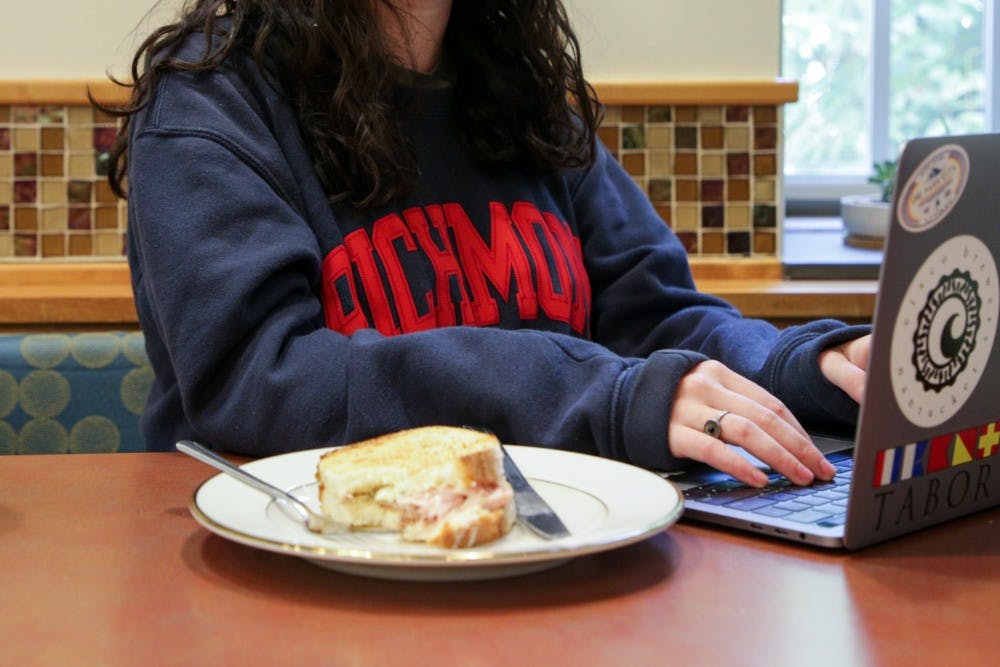Over the summer, University Dining Services announced in a series of SpiderBytes that it would make several changes to campus cafes Passport and 8:15 at Boatwright to help boost sustainability on campus, such as introducing mugs, plates and different lids.
These updates came from Maya Vincelli, assistant director of retail operations for Dining Services, who wrote in an email that these decisions had been made based on student and faculty requests.
Vincelli wrote that Dining Services was always working toward improving sustainability and making things “fresh and interesting.”
Although the most notable change in 8:15 at Boatwright was the switch from Starbucks to La Colombe coffee, smaller changes were also rolled out over the summer. The cafe now offers plates for hot food.
“With the help from our friends in catering, we found some vintage service [ware] that wasn’t really pristine enough for a fancy catering event, but still had a lot of life,” Vincelli wrote.
Another change at 8:15 at Boatwright was the use of lids that were designed to eliminate the need for a straw. Vincelli wrote that this change had been specifically requested by students since many wanted to eliminate plastic straw use.
Meanwhile at Passport, more reusable dishware was added for sit-down customers. Although Passport has always offered mugs and bowls for customers who choose to dine in, staff members introduced ceramic plates as well for baked goods, entrees and sandwiches.
Even though the reusable dishes are harder on the staff because they require more labor to clean, Vincelli wrote, it is a steps towards eliminating single-use plastic that Dining Services is “willing to try out.”
Vincelli said Dining Services had worked closely with the Office of Sustainability to make several changes to help Dining Services “do better all the time.”
Junior Brianna Lebeck, an intern at the Office for Sustainability, says sustainability staff members had worked continuously with Dining Services for several of its initiatives on campus.
Lebeck, who often oversees waste and trash projects on campus, finds that much of the waste comes from single-use plastics in the cafes.
“The biggest area of waste seems to be from people eating,” she said. “Everything is packaged in plastic and everyone uses it.”
Enjoy what you're reading?
Signup for our newsletter
Lebeck said she was glad to see improvement from Dining Services and thinks it is important that Dining Services make changes to be more environmentally conscious.
“There’s also always space for more,” she said. “It’s not their main goal, but I think they’re making it a solid goal.”
The Heilman Dining Center was sometimes too large to roll out projects the Office of Sustainability wanted to test, Lebeck added. Therefore, places like 8:15 at Boatwright and Passport are great places to implement pilot programs in order to measure the reduction of waste on a smaller scale, she said.
Junior Abdul Qadeer Rehan, another intern at the sustainability office, has worked on several projects with Dining Services and noted that, although the efforts Dining Services has made so far are great for sustainability, often the best solution might not be the most popular.
Although it could be more cost-effective for a place like 8:15 at Boatwright to stop buying plastic altogether, Rehan said it might not be ideal for students who still use plastic for on-the-go drinks.
“It’s a major challenge so we try to think of the best solutions that places on campus can use,” Rehan said.
Rehan said he hoped Dining Services could continue on the path toward furthering sustainability and had several projects as an intern that he was eager to work on.
“There’s always room for improvement,” Rehan said, “And there’s always new products on the market, which is diverse enough where we can choose the most sustainable one.”
Vincelli wrote that Dining Services was very receptive to the campus community’s requests and would continue to make improvements to be more sustainable.
“We really hope that people will take a break, and have their meals with us, in the café on real plates with real silverware,” Vincelli said. “Good things happen when we take care of ourselves, and the planet.
“The only thing that we hope is this: that our customers feel welcome and engaged in our café spaces, and that we are all working on making better habits in regards to sustainability, one small change at a time.”
Contact contributor Lena Jacobson at lena.jacobson@richmond.edu.
Support independent student media
You can make a tax-deductible donation by clicking the button below, which takes you to our secure PayPal account. The page is set up to receive contributions in whatever amount you designate. We look forward to using the money we raise to further our mission of providing honest and accurate information to students, faculty, staff, alumni and others in the general public.
Donate Now



